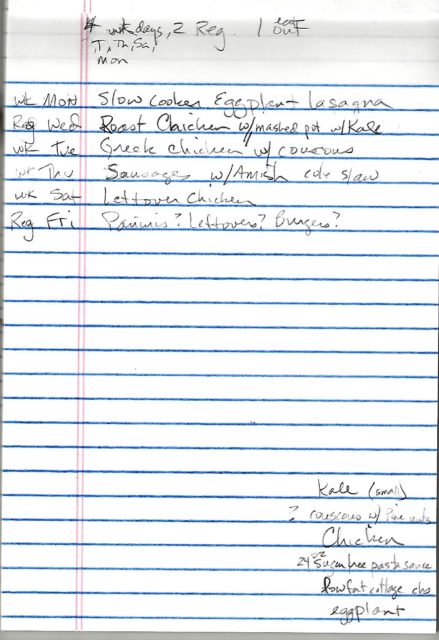Meal Planning?! Who Really Does That??
Well, starting a couple of months ago, I do.
Planning meals a week in advance sounds like a tedious chore that will result in having to eat food you might not want on the day it’s planned for.
It’s actually a fun research project that saves you both time and money at the grocery store.
Face it: without a plan, your buying is based on what jumps off the shelves into your cart because…it’s easy, it sounds fun, it’s fast, it’s new, it’s chocolate…. Stores place those foods where you can easily see them because the markup nets the manufacturer or retailer a lot of money, or there’s a deal to encourage you to spend money buying multiples you don’t need or want.
Grocery shopping can be a little like gambling—if you go without a plan and just decide what to buy as you go, you will lose money. Remember, “the house always wins”.
I’m not going to pretend I have the perfect meal planning process for you. I’m just going to tell you what I do, which does save me significant time and some money at the store.
- I skim through my recipes, which are all digitized (see my blog on that here), but you can do it in your favorite cookbooks, your recipe file box, or for real fun, online. I look in my “Main Dishes” file for days I don’t work, and my “Slow Cooker” file for the days I do work. (I also make a mental note of the days I won’t be home for dinner at all.) If nothing jumps out at me from my own recipe files, I browse through online recipe sites to find things I can get excited about. I try a lot of new things this way.
- While I’m browsing recipes, I have a small lined pad of paper at hand, the size of a steno pad. When I find a recipe that appeals to me, I write the name down on the left side of the paper, leaving a small left-hand margin. I read through the recipe, and on the bottom right side of my paper, I write down any ingredients I don’t already have in the house. (Big pat-myself-on-the-back bonus if something that looks really good can be made with only stuff I already have in the house.)
- Then I decide if any of the main dishes I chose for dinner need a side dish, and I repeat the process from within my “side dishes” file, writing the side dish down next to the dish it will accompany. And again adding ingredients I don’t have in the house to the list on the right.
- Next, in the margin on the left, I write down days of the coming week next to the day I’ll prepare that meal.
- Here’s the best part—as the week progresses, I can change the days around. Something I thought was going to be Monday’s dinner may get moved to Thursday. Or…and this happens often…we end up with leftovers we want to eat, and they replace one of the planned meals for the week. I just push that meal into the next week, and the planning and shopping for that is already done. I don’t think I’ve ever made it through a whole week on the exact schedule I planned.
- I have a chance at that point to consider the likely price of things (do I really want to do that lobster recipe?) and availability (will the strawberries be worth the price, since they’re not in season?) I revise my meals list accordingly. I add the items on the bottom right of the page to my weekly grocery staples list (milk, eggs, whatever), and I’m ready for the store.
- If you decide to try this, here is the most important point: STICK TO THE LIST. With a focus on finding your list items, you will be less distracted by (and drawn to) those impulse things the store wants you to buy. Oh, and don’t go shopping when you’re hungry. That will cost you a LOT of unplanned money.
The time you spend creating your list each week will save you the frustration and time of wandering around the store in a daze looking for something that “sounds good”. And the ingredients you buy are much more likely to be budget-friendly than the prepared foods you would buy on a hungry whim.
It’s not hard, it can become pretty fun, you’ll try a lot of new foods, and you’ll save both time and money. Try it out for two weeks, and let me know what you think.







